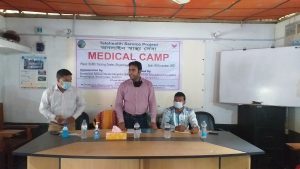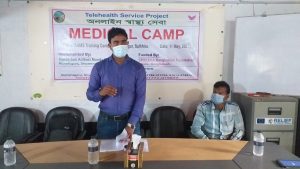Tele health Program
Bangladesh suffers from both the shortage of and geographic mal-distribution of healthcare professionals. There are an estimated 6.33 physicians per 10,000 of the total population in here (MoHGW, Health Bulletin 2018). The growing population do not have adequate access to general practitioner physicians, especially in remote locations, rural areas and semi-urban areas where long commute is needed to go see the physician and timely transportation is also a problem. Homebound, elderly and female patients also find it difficult to avail regular healthcare from public and private healthcare facilities. Hence, our people have developed an age-old tradition of buying medicines and seeking for health tips from local pharmacy-keepers without proper screening and prescriptions from physicians or even paramedics.
The above-mentioned situation is likely to create a backlash for our healthcare system and develop a cycle of delay in health seeking behavior among the mass and give rise to the scope of soon-to-happen public health hazard. Sneho Mobile Health model can become a bridge between the gaps of supply and demand of healthcare professionals in remote locations through establishing a low-cost and mobile healthcare facility.
Project Goal
Mobile Health is a creative healthcare solution for individuals, families and communities to provide them with easy access to tele-consultation and primary healthcare when direct access to physician is difficult to avail. It brings healthcare closer to patients’ home through connecting them with physicians and health workers using the means of digital technology (e.g. video call, audio call, door to door patient care by health workers, e-prescriptions etc.).
Project Objectives
(a) Provide access to general physician via digital technology in remote doctor chamber (RDC) within the community.
(b) Provide door to door healthcare through mobile health worker service for homebound and vulnerable patients.
Expected Results
(a) Community members living nearby will get direct access to tele-consultation from general physician.
(b) Community members living nearby will get access to basic facilities like first aid, basic medicines, BP measurement etc.
(c) Community members do not live nearby and who are homebound, critical patients will get direct
access to physician at the comfort of their home.


Aware Conception for Munda Community (ACMC)
Project Background:
The South-West region of Bangladesh there is indigenous Munda people. Our forefathers were come from India (Jharkand state, Ranchi District) about 230 years ago. Most of our adult men and women are illiterate. They have no enough knowledge about sex education, physical change and sex diseases. They are day laborer. Male and female work in the field all day and comeback home in the afternoon. They do not eat potential food and do not take enough rest. Under this project we would like to aware about their physical relationship, physical changes, sex diseases and how to avoid unexpected children. Because, we know nuclear family become happy than extended family. A nuclear family member gets delicious food but extended family suffers nutrition. We hope that, under this project we will able to make a nuclear family and they will get proper nutrition food and healthy sounds.
Main Objectives:
(a) Facilitate the initiation of women, adolescent health activities
(b) Mobilize Munda women for conception and sex education.
(c) Implement all activities of birth control and build up happy conjugal life.
